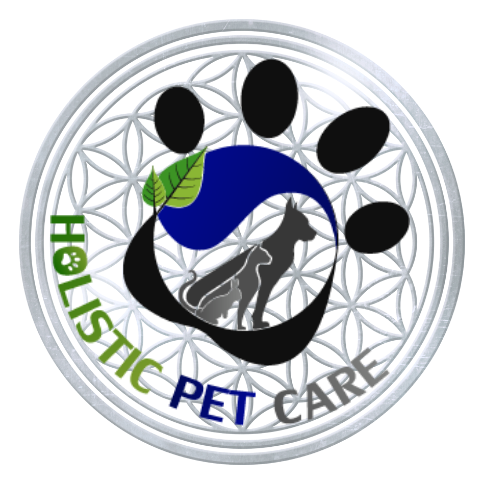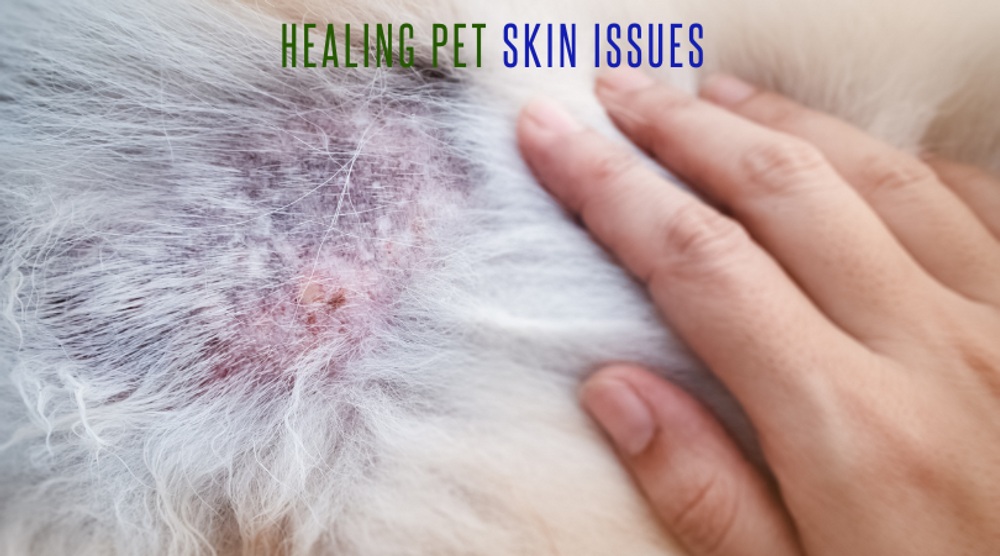Healing Pet Skin Issues from the Inside Out
Posted by Jewel on May 21, 2025
Is Your Pet’s Skin Telling You Something Deeper?
If you’ve been battling your dog or cat’s itchy skin, rashes, or constant scratching — you’re not alone. And you’re definitely not crazy for feeling overwhelmed. Skin issues can feel like a game of whack-a-mole: you treat one symptom, and another one pops up.
Many pet parents try shampoos, sprays, or medications that only bring short-term relief. But here’s the truth: skin issues are rarely just skin deep. The real healing begins from within.
The Gut–Skin Connection
Think of your pet’s body like a garden. When the soil (gut) is imbalanced or overrun with the wrong microbes, no amount of weeding (treating symptoms) will restore health. You have to nourish the roots.
-
A disrupted gut microbiome leads to inflammation, which shows up on the skin.
-
High-carb, processed foods (especially kibble) can fuel that inflammation.
-
Overuse of antibiotics, vaccines, or chemicals can weaken your pet’s inner terrain.
That means your pet’s itching, redness, hot spots, or flaking skin is likely a gut imbalance manifesting through the skin.
Start with Food as Medicine
The foundation of healing is nutrition. A raw, species-appropriate diet can dramatically reduce inflammation and allergic responses.
? Switching to a raw diet alone can eliminate up to 50% of itching symptoms in dogs!
Feed the Gut Garden
To restore balance from the inside out, focus on nourishing the microbiome:
-
Probiotics: Look for strains like that have several strains and also with digestion enyzmes like the Pet Health and Nutrition Center Digestive enzyme and PROBIOTIC Supplement to crowd out harmful bacteria.
-
Soluble fiber: Feed prebiotic-rich foods that are low carb, like leafy greens, blue green algae, spirulina, dandelion greens ( see more below).
-
Fermentable low carb: Include small amounts of low-sugar fruits (less then 10% of the diet).
These ingredients act like compost — feeding the good bugs and restoring harmony within the gut.
Prebiotic Benefits for Dogs
1. Dandelion Greens
-
Why they help: Rich in inulin, a natural prebiotic fiber that feeds healthy gut bacteria.
-
Benefits:
-
Supports a balanced microbiome
-
Helps with digestion and regularity
-
Gently detoxes the liver and kidneys
-
-
How to use: Finely chopped fresh leaves (small amounts) or dried powder sprinkled on food.
2. Spirulina
-
Why it helps: While not a fiber-based prebiotic, spirulina stimulates the growth of beneficial bacteria like Lactobacillus and Bifidobacteria.
-
Benefits:
-
Natural detoxifier (binds to heavy metals)
-
Immune booster
-
Rich in antioxidants and protein
-
-
How to use: Start with a small pinch and build up to 1/8 to 1/4 tsp for small dogs, 1/2 tsp for larger dogs daily.
3. Blue-Green Algae (Aphanizomenon flos-aquae - AFA)
-
Why it helps: Similar to spirulina, it provides micronutrients and can encourage a healthy terrain for probiotic bacteria to thrive.
-
Benefits:
-
Nutrient-dense (amino acids, B vitamins, trace minerals)
-
Supports mental clarity and energy
-
May improve absorption of other nutrients
-
-
How to use: Choose only wild-harvested, toxin-tested forms. Dose lightly: 1/8 tsp or less per 25 lbs of body weight.
Why They're Great Together
These supergreens:
-
Gently detoxify and alkalize the body
-
Provide nutrients that improve immune function
-
Help balance the gut by either feeding good bacteria (like dandelion) or creating a healthy internal environment (like spirulina and AFA)
Some other Low-Carb, Prebiotic-Rich Foods for Dogs
These support gut health, immunity, and detox without spiking blood sugar.
Leafy Greens (Lightly Steamed or Pureed)
-
Kale: High in fiber, antioxidants, and chlorophyll
-
Swiss chard: Supports liver detox and digestion
-
Collard greens: Great calcium and fiber source
-
How to serve: Chop finely and steam lightly to aid digestion; or blend into food
Inulin-Rich Herbs & Veggies
-
Chicory root (dried/powdered): Top source of inulin, a powerful prebiotic
-
Jerusalem artichoke (small amount): High in inulin and feeds good gut flora
-
Dandelion greens: Gentle detox, prebiotic, and mineral-rich
-
How to serve: Use dried powders or small bits of steamed root; rotate them weekly
Small Amounts of Dog-Safe Aromatic Herbs
-
Fennel: Helps digestion and feeds gut bacteria
-
Parsley: Freshens breath, rich in fiber and chlorophyll
-
Basil & oregano: Contain compounds that support microbial balance
-
How to serve: Mince finely and sprinkle a pinch on meals
Superfood Algaes
-
Spirulina: Encourages healthy gut flora and detox
-
Blue-green algae (AFA): Nutrient-dense, supports immune and gut function
-
Chlorella: Helps bind toxins and feeds friendly bacteria
-
How to serve: Use very small amounts—micro-scoop doses are powerful
Medicinal Mushrooms (Prebiotic & Immune Boosters)
-
Reishi, Turkey Tail, Shiitake: Rich in beta-glucans (fermentable fibers that nourish good gut bacteria)
-
How to serve: Use dog-safe mushroom powders or tinctures; rotate 1–2 times per week
Combine for a Superfood Topper
Mix together:
-
1 tsp finely chopped steamed kale
-
A pinch of spirulina
-
½ tsp dandelion greens
-
A dash of goat kefir (for probiotics)
This creates a powerful, gut-nourishing, low-carb supplement to your dog’s daily food.
Safe Low-Sugar Fruits (for less then 10% of diet)
These fruits are low in sugar, rich in fiber and antioxidants, and generally well-tolerated:
1. Blueberries
-
High in fiber and polyphenols
-
Supports brain, heart, and immune health
-
Antioxidant-rich and anti-inflammatory
-
Serving: A few berries for small dogs, a small handful for large dogs
2. Green Apples (peeled, no seeds)
-
High in pectin (a fermentable fiber)
-
Supports digestion and bowel regularity
-
Serving: 1–2 thin slices
3. Raspberries or Blackberries
-
High in fiber, low in sugar
-
Contain ellagitannins which support gut microbes
-
Serving: 2–4 berries depending on size
4. Cranberries (unsweetened, dried or raw)
-
Support urinary tract health
-
Contain prebiotic compounds
-
Serving: Use sparingly—½ tsp chopped
5. Pears (ripe, peeled, no seeds)
-
Rich in fermentable fibers like pectin and inulin
-
Mild and gut-soothing
-
Serving: Small slivers
Why Include Fruits in a Dog’s Diet?
-
Feed beneficial bacteria → keeps digestion smooth and immune system balanced
-
Reduce inflammation → especially in dogs with allergies or chronic issues
-
Add natural enzymes, vitamins & antioxidants
-
Encourage regularity without irritating the gut like grains can
Feed With Care in small amounts
-
Always introduce gradually to avoid gas or loose stools
-
Choose organic, especially for thin-skinned fruits
-
Avoid grapes, raisins, cherries, or citrus (toxic or too acidic for dogs)
Cooling & Healing Herbs for Dogs with Skin Conditions
Some skin issues need extra support to calm inflammation and rebalance energy. This is where herbs shine.
A holistic list for skin inflammation, itching, and redness
When a dog’s skin is red, itchy, inflamed, or irritated, it often reflects internal heat and imbalance. The following herbs have traditionally been used to help cool and heal from the inside out.
1. Nettles (Urtica dioica)
-
Natural antihistamine
-
Reduces allergic reactions and itching
-
Rich in minerals that support healthy skin
2. Burdock Root (Arctium lappa)
-
Supports liver function and detoxification
-
Helps purify the blood
-
Gently clears chronic skin issues and bacterial imbalances
3. Red Clover (Trifolium pratense)
-
Lymphatic system support
-
Detoxifying and blood-cleansing
-
Helpful for chronic or heat-based skin issues
4. Dandelion Root and Leaf (Taraxacum officinale)
-
Promotes liver and kidney health
-
Aids in removing internal heat
-
Balances digestion and reduces skin flare-ups
5. Calendula (Calendula officinalis)
-
Anti-inflammatory and wound-healing
-
Can be used both internally and topically as a calendula salve or spray
-
Calms hot, irritated, or broken skin
6. Chamomile (Matricaria recutita)
-
Mild calming herb for both skin and nervous system
-
Reduces inflammation
-
Beneficial for stress-related skin flare-ups
7. Oregon Grape Root (Mahonia aquifolium)
-
Antimicrobial and antifungal properties
-
Supports liver detoxification
-
Useful for dogs with chronic skin infections or yeast
8. Alfalfa (Medicago sativa)
-
Rich in minerals and chlorophyll
-
Helps neutralize internal acidity
-
May help reduce systemic inflammation
9. Licorice Root (Glycyrrhiza glabra) (short-term use only)
-
Natural anti-inflammatory, similar to corticosteroids
-
Useful for acute flare-ups of itching or swelling
-
Supports adrenal and immune function
10. "Cool the Blood" Formula (Traditional Chinese Medicine)
-
A blend designed to clear internal heat and reduce skin inflammation
-
Especially effective for red, rashy, or allergy-prone dogs
“Cool the Blood” by Kan Essentials is an excellent Traditional Chinese herbal formula that helps soothe red, hot, irritated skin from the inside out. This formula includes herbs: Chinese red peony root (Chi shao), Chinese rhubarb rhizome & root (Da huang), Chinese salvia root and rhizome (Dan shen), Coptis rhizome (Huang lian), Forsythia fruit (Lian qiao), Gardenia fruit (Zhi zi), Honeysuckle flower (Jin yin hua)
How to Use These Herbs
-
Internally: Use tinctures, teas, or powders mixed into food. Start with small doses and observe your pet’s response.
-
Topically: Herbal rinses, infused oils, or salves can be applied directly to affected areas.
-
Quality matters: Always choose organic and pet-safe formulations.
Think of it like bringing in ladybugs to your garden to handle aphids — you’re supporting natural balance instead of just spraying the symptoms away.
Colloidal Silver: A Natural Skin Healer
In addition to raw diet, probiotics, herbal support, colloidal silver is one of the most versatile and effective natural remedies for external skin conditions in dogs. Can be given internally as well as on the effected area.
How Colloidal Silver Helps:
-
Antimicrobial: Kills bacteria, fungi, and viruses on contact
-
Soothing: Calms inflammation and reduces itching
-
Non-toxic: Safe for external use even on broken or sensitive skin
Common Uses:
-
Apply with a cotton pad to hot spots, wounds, rashes, or insect bites
-
Use as a gentle spray on itchy areas
-
Can be combined with herbal rinses like calendula or chamomile for added benefits
Colloidal silver can be used alongside herbal therapies and is an excellent first-aid solution for skin flare-ups or infections.
Heal the Soil, Not Just the Surface
Just like a garden thrives with rich, balanced soil, your pet’s skin will flourish when their inner terrain is supported.
Instead of chasing symptoms, tend to the roots — with clean, nourishing food, gut-healing support, and gentle herbal allies. This is the heart of holistic healing.
Because a truly healthy pet doesn’t just have good skin — they glow from the inside out

